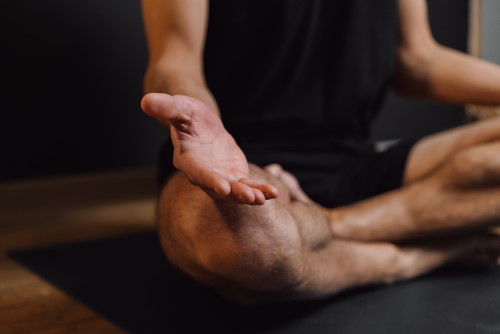Don't know how to relax? "Toxic productivity" is a common problem. Psychology experts explain how—and why—to slow down if you're someone who's constantly in motion.
Searching for How to relax?
Have a tough time relaxing? You might even actually consider this hustling-to-a-fault trait to simply be part of who you are. But really—it may be time for a breather.
In March 2022, a survey by the American Psychological Association (APA) found that inflation, the Covid pandemic, and the Russian invasion of Ukraine had led Americans to experience stress at what the APA called “alarming” levels. Being so in our heads, on our phones, and on-the-go comes with consequences: a growing body of research on stress has shown its links to heart problems, mental health, and even brain development.
BREAKING: Big Pharma In Outrage Over This Breakthrough Natural Painkiller
Even for the most contentedly industrious among us, learning how to relax can bring some much-needed tranquility. Psychologist Haley Perlus, PhD, says there are a few types of people who find it tough to relax. “Some people feel guilty if they’re not always working, in motion, or under stress,” Dr. Perlus tells The Healthy, explaining how the constant need to keep busy—recently dubbed “toxic productivity”—validates an intrinsic desire to be productive members of society. Unfortunately, this can turn unhealthy, fast. Dr. Perlus says these people focus more on checking boxes off a never-ending to-do list than taking time to be still and recharge.
For others, the inability to relax is related to anxiety. “Some people suffer from a generalized anxiety disorder, where they experience anxiety even under the most relaxing circumstances,” says Dr. Perlus. If you’ve ever had trouble focusing on a good massage or just lying on the beach without your mind racing, you might fall within this category.
Finally, Dr. Perlus says, there’s a category of people who are simply overworked, over-scheduled, and overstressed. If this sounds familiar, you might be someone who feels the need to meet others’ expectations while also having difficult setting boundaries around “me” time.
What are ways to relax naturally?
A 2021 behavioral health study examined the clinical benefits of breathwork, guided imagery, and progressive muscle relaxation (PMR) techniques. The researchers concluded these natural relaxation methods are beneficial in reducing anxiety, stress, depression, and pain.
A 2020 study published in the Irish Journal of Psychological Medicine looked at the effects of meditation and mindfulness exercises on stress reduction, particularly during times of crisis (like the Covid-19 pandemic). The study suggested that on average, participants who practiced meditation and mindfulness-based stress reduction techniques experienced improvements in measures of anxiety, depression, and pain scores.
Elisabeth Netherton, MD, a psychiatrist with Mindpath Health, says even everyday activities can help you relax naturally. “Take a walk, listen to music, take a warm bath, hold a pet, schedule time free from electronics, bake, do a puzzle, draw, or try therapy,” she suggests.
But if life doesn’t quite afford you those quiet luxuries, consider these expert-suggested techniques instead.
10 Ways to Relax
From research and experts in psychology and mindfulness, here’s a list of instant solutions to bring your attention to center and just…slow down.
1. Box breathing
While there are many deep breathing exercises, the 2021 behavioral health study, which was conducted at the Campbell University School of Osteopathic Medicine (in conjunction with Nova Southeastern University) found box breathing beneficial for relaxation.
This technique can be implemented before, during, or after stressful experiences. The researchers suggest box breathing doesn’t require a calm environment to be effective and consists of four simple steps. (Note: visualize a box with four equal sides while you engage in this exercise.)
- Step One: Breathe in through the nose for a count of four.
- Step Two: Hold breath for a count of four.
- Step Three: Breath out for a count of four.
- Step Four: Hold breath for a count of four.
- Repeat
2. Progressive muscle relaxation (PMR)
The researchers from the same study implemented progressive muscle relaxation as a technique that targets tension associated with anxiety. The exercise involves tensing and releasing muscles progressively throughout the body and focusing on the release of the muscle as the relaxation phase.
You can do progressive muscle relaxation on your own in eight easy steps. (Note: During the release of each exercise, focus your attention on the release of tension and the feeling of relaxation you experience.)
- Step One: Sit or lie down comfortably in a space with minimal distractions.
- Step Two: Starting at the feet, curl your toes and tense the muscles in your foot. Hold for five seconds, then slowly release for 10 seconds.
- Step Three: Tense the muscles in the lower legs. Hold for five seconds, then slowly release for 10 seconds.
- Step Four: Tense the muscles in the hips and buttocks. Hold for five seconds, then slowly release for 10 seconds.
- Step Five: Tense the muscles in the stomach and chest. Hold for five seconds, then slowly release for 10 seconds.
- Step Six: Tense the muscles in the shoulders. Hold for five seconds, then slowly release for 10 seconds.
- Step Seven: Tense the muscles in the face (for example, squeeze your eyes shut). Hold for five seconds, then slowly release for 10 seconds.
- Step Eight: Tense your hand muscles, creating a fist. Hold for five seconds, then slowly release for 10 seconds.
3. Guided imagery
The 2021 behavioral health study found guided imagery to be an effective relaxation exercise. The technique involves visualizing tranquil settings to help manage stress and remove distractions from intrusive thoughts. Guided imagery uses all five senses to create a more profound sense of relaxation with the following three steps:
- Step One: Sit or lie down in a comfortable space with minimal distractions.
- Step Two: Visualize a relaxing environment, either from memory or imagination. Use the following prompts to bring forth elements of the environment using all five senses:
– What do you see?
– What do you hear?
– What do you smell?
– What do you taste?
– What do you feel?
- Step Three: Keep visualizing as long as needed while taking slow, deep breaths. Focus on the feelings of calm associated with being in a relaxing environment.
4. Meditation
According to a 2020 study in the Irish Journal of Psychological Medicine, learning how to meditate can calm the mind and enhance self-awareness, mental awareness, and environmental awareness. Meditation allows you to observe your thoughts and emotions in a detached, non-judgmental way.
Systematic reviews of meditation have shown benefits in reducing stress, anxiety, and depression. The best part of meditation? Just sit down, close your eyes, and bring your attention to your breath to get started.
5. Mindfulness-based stress reduction
The term “mindfulness” is often used interchangeably with meditation, but experts point out that subtle differences exist. Mindfulness simply means tuning in and becoming aware of the present moment. Observing the moment and allowing thoughts to flow without attachment results in calm, stillness, and relaxation.
6. Exercise
Exercise is nature’s feel-good drug. “People often tell you to rest and relax when stressed out. While there’s nothing wrong with that, sometimes, what we need to do is get moving,” explains Dr. Perlus. “There’s science behind why exercise reduces stress and anxiety. Exercise reduces levels of stress hormones, such as cortisol and adrenaline. It kicks up the production of endorphins which are mood elevators. That’s why you often hear the phrase ‘runner’s high.'”
7. Go for a walk in the sun
According to The American Institute of Stress, getting fresh air and moving your body for even 10 minutes can clear your mind and help you relax. Also, vitamin D from sun exposure can help boost your mood instantly.
8. Find your purpose
“One way to manage stress is to find your purpose and recognize what speaks to you,” advises Dr. Perlus. “For example, if you have a passion for photography, create a website that displays your work. Your stress levels can decrease significantly by finding something you enjoy and taking advantage of it.”
TRENDING: Men Try This Tonight - You'll Never Need The Pill Again
9. Take a break from your smartphone
You already know what Dr. Perlus explains next: “Many of us are overly dependent on our phones or computers. Using them too much or too long can increase stress levels, and studies have shown this.”
She adds that excessive smartphone use is linked to mental health disorders and depression.
10. Control only what you can
Instead of stressing out about the future, Dr. Perlus recommends, “Shift your focus to what’s within your control.”
That might include “cleaning your space, clearing your head, exercising, and doing things you enjoy to help you relax,” she says.









